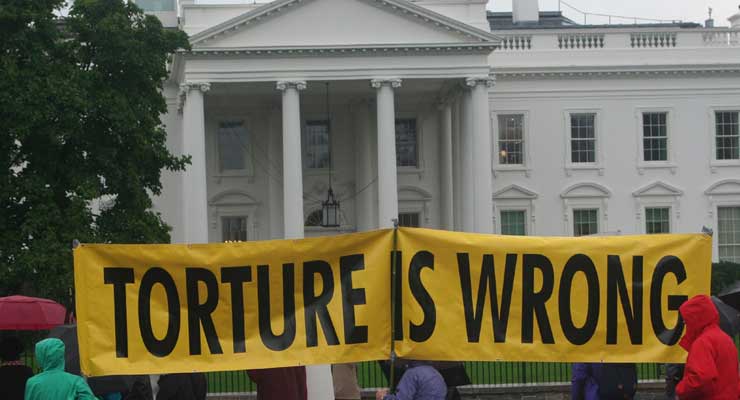
In 1949, just after World War II, the Geneva Conventions were established to set standards for the humanitarian treatment of wartime prisoners. The Conventions are a set of treaties adopted by all nations in the world defining these prisoners’ inalienable rights and stating the protections entitled to the wounded combatants. However, the rise of terrorism has caused for US officials to feel the need to treat those involved with terrorism in a manner that does not abide by the provisions set in the Conventions. Thus, in 2002, they issued the Torture Memos, which lays out a very narrow view of what behavior might constitute torture. This helps interrogators in the CIA avoid prosecution, despite the inhumane actions they are taking against detainees in Iraq, Afghanistan, Guantanamo Bay, and other locations. However, in my opinion, the US’s rejection of the Geneva Convention in favor of the Torture memos is not effective. Such rejection taints the US’s reputation as a nation committed to human rights, allows for the violation of human rights to drastically increase, and provides the president with too much authority as commander in chief.
The US is a nation with strong constitutional protections for basic rights. It is a nation supposedly dedicated to life, liberty, and the pursuit of happiness, yet it commits serious violations of these rights when terrorism is brought into question. It is argued that the maltreatment of suspected terrorists is committed to ensure safety and security; torturing them may cause them to eventually disclose information on terrorist activities.
But, how can the US, a nation founded on freedom, allow for the torture of people who are only suspect?
A glimpse into a book I very much enjoyed, the Guantanamo Diary, written by Mohammedou Slahi, who was detained on suspicion of being involved in a plot to bomb Los Angeles international airport, details the acts of torture committed by the US rendition and torture program against him. He was subjected to death threats, sleep deprivation, and sexual humiliation even though there was no evidence against him. Slahi was tortured to the point where he actually made false confessions. The US can be seen by other nations as hypocritical; they may come to realize that the legal standards in the US Constitution do not apply to everyone around the globe and that the US’s commitment to life, liberty, and the pursuit of happiness are merely circumstantial. In Slahi’s circumstance, Constitutional freedoms do not apply. However, if another country detained an American soldier on the grounds of violating humanitarian law, wouldn’t the US want Geneva Convention protections applied to him?
In addition to tainting the US’s reputation, the rejection of the Geneva Conventions by the US could cause an increase in humanitarian crime. If the Conventions do not apply, then not only could the US inflict torture on suspects, but terrorist groups would be open to being able to do so as well. There would be no limits to torture, since the Torture Memos replacing the Conventions have such a narrow definition. If a detainee decides not to divulge information after being shaken or hit, the government could move on to more severe measures, such as the application of electric shocks and rape. Once torture is allowed, setting the limits would be extremely difficult. As a result, no one would be able to enjoy the benefit of their protections as a matter of law.
Finally, the president has the power to approve of any technique needed to protect the nation’s security. Thus, he has the authority to order physical and psychological torture, despite federal laws stating otherwise. In the Pentagon’s torture memo in 2004, the president’s power is justified on the grounds that “the greater good for society will be accomplished by violating the literal language of criminal law.” However, allowing the president’s powers to override federal laws prohibiting torture implies that his power is supreme, creating an imbalance within the branches of US government, completely violating the strong separation of powers that forms the basis of the Constitution.
No branch of government should be able to act alone, no matter how long and cumbersome the legislative process may be, because by giving the President, one man, too much unbridled power, future tyranny is more likely to occur. I am not claiming to know the answer to tackling terrorism. But, I do know that the Torture Memos are ineffective because we still see, 14 years later, terrorism continuing to rapidly perpetuate and destroy too many innocent lives.
Leave a Reply